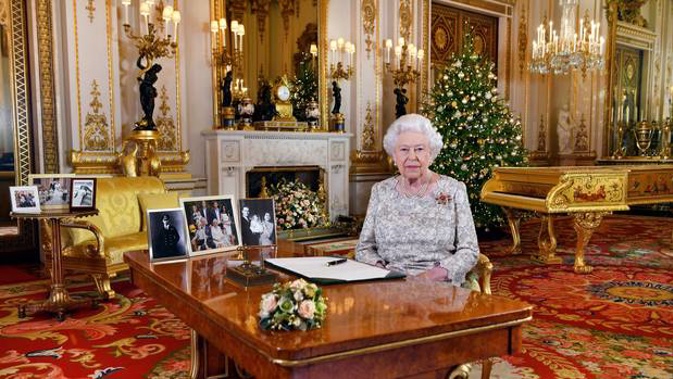
For many Brits, nothing says Christmas quite like the queen's annual broadcast on December 25.
After the turkey is carved, drinks are flowing, presents are stacked and families are gathered, millions tune in to watch the reigning monarch, Queen Elizabeth II. The speech is used by the queen to reflect on the past year and often to convey an overarching message of hope to those across the commonwealth. (Side note: The speech usually features a tastefully decorated backdrop and jewelry that we can only assume are very expensive pearls.)
But this royal tradition didn't start with the queen, her towering trees and a gold piano; the first Christmas Day address by a reigning monarch dates back to 1932 and was delivered by the queen's grandfather, King George V.
According to the website of the British royal family, George was skeptical at first of using radio as a means to communicate with his people, yet he was reassured after visiting the BBC offices. A studio was created at Buckingham Palace for him to transmit the speech live - words carefully crafted by the writer Rudyard Kipling.
"I speak now from my home and from my heart to you all; to men and women so cut off by the snows, the desert or the sea, that only voices out of the air can reach them," the king began, citing the power of technology. The first broadcast attracted an estimated 20 million listeners. The king continued to deliver a broadcast until a month before his death in 1936.
Since Elizabeth took the throne during her coronation in 1953, she has delivered her message every year, apart from 1969, when a royal documentary was scheduled to be televised at the same time. The queen usually broadcasts from Buckingham Palace, although she has changed the setting from time to time. Past broadcasts have been hosted from the grounds of the palace and Southwark Cathedral.
In 1957 came the first televised broadcast, a historic move that some believe helped further humanise the royal family and extend the global reach of the British monarchy. The broadcast was live, and according to the Guardian, adverse weather conditions enabled American police radio transmissions to interfere with the broadcast. It is said that some listeners heard a police officer say, "Joe, I'm gonna grab a quick coffee."
Over the years, the royal Christmas address has transformed as technology has. In 1967 came the first broadcast on color television. In 2012, the queen took her message to another level and transmitted in 3-D and HD format - much to the delight of many.
Over the decades, the queen has referenced an array of delicate issues including natural disasters, terrorist attacks, the devastating Grenfell Tower fire of 2017 and of course her famed 1992 speech in which she uttered the words "annus horribilis."
It wasn't just her Christmas speeches that were memorable. In a November 1992 speech, the queen referred to a tumultuous year as "annus horribilis" - a Latin phrase that translates to "horrible year." Although the speech marked 40 years of her succession to the throne, the significance of this date was largely overshadowed by a string of events that only fueled the unpopularity of the royal family.
The year saw the queen's eldest son and heir to the British throne, Prince Charles, separate from his wife, Princess Diana. In the same year, her son Andrew's separation from wife Sarah Ferguson was announced by the palace. Ferguson, commonly known as "Fergie" in Britain, became embroiled in a royal photo scandal. As if that weren't enough, the queen's daughter, Princess Anne, also divorced her husband, Mark Phillips.
It wasn't just a bad year for royal relationships: In the fall of 1992 a fire broke out at Windsor Castle, one of the queen's official residences - and more recently the venue Prince Harry and Meghan Markle chose for their wedding this year. The blaze destroyed more than 100 rooms and burned for 15 hours. Artworks were also lost to the flames.
"1992 is not a year on which I shall look back with undiluted pleasure. In the words of one of my more sympathetic correspondents, it has turned out to be an 'annus horribilis.' I suspect that I am not alone in thinking it so," the queen said at the time.
Her annual Christmas speech has also been known to highlight the good. From new laws to new members of the royal family, the queen's speech often outlines progress, change and hope for a better future. In 2013, the queen delivered her speech with a framed photo of Prince George in the background. The broadcast painted a picture not just of a ruling monarch, but of a proud and loving great-grandmother, too.
As 2018 draws to a close and 2019 approaches, Theresa May's looming Brexit deadline in March remains a hot topic. Can the prime minister pass her deal in time in to avoid further political upheaval?
"This year the queen has made a call for national unity at a time of deep division at the time of Brexit," said royal commentator Richard Fitzwilliams.
"Britain faces a very uncertain and politically unstable new year, with deep divisions over Brexit and no clear end in view. The royal family embody a continuity and national unity which has never been more precious."
While many Brits sit and watch the speech, raising a glass in the name of tradition, other observers tend to look for hidden meanings in her words. Members of the royal family are politically neutral, so it is common for Brits to look beyond the surface to find more substance in her majesty's remarks. This year's message will see the queen encourage Brits to overcome "deeply held differences" - a comment that many believe is a direct nod to the Brexit chaos of the past two years.
Take your Radio, Podcasts and Music with you









